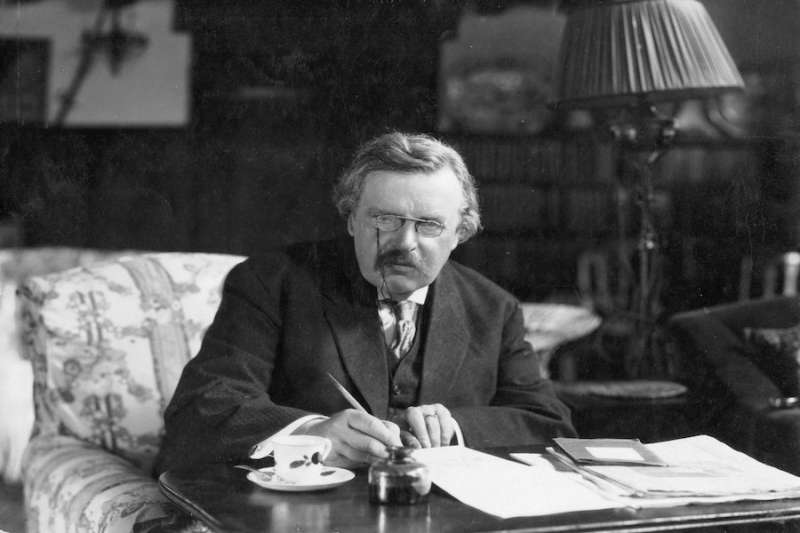A cause for the canonization of the pipe-smoking, plain-talking, mustachioed and beloved Catholic author Gilbert Keith (GK) Chesterton will not be opened, announced Bishop Peter Doyle of Northampton, the late Chesterton's home diocese.
Despite Chesterton’s inspirational writings and his role in the Catholic revival in England during the early 20th century, several obstacles stand in the way of advancing the author’s cause for canonization, Doyle said in a letter read to the opening session of the American GK Chesterton Society conference.
The three concerns cited by Doyle are that Chesterton lacks a “cult” of local devotion, the lack of a “pattern of personal spirituality” that could be discerned through his writing, and charges of anti-Semitism in his writing.
“I am very conscious of the devotion to GK Chesterton in many parts of the world and of his inspiring influence on so many people, and this makes it difficult to communicate the conclusion to which I have come,” the bishop said, according to the Catholic Herald in the U.K.
Chesterton was born in 1874, and became a prolific writer and staunch Catholic apologist after his conversion to the faith. He is renowned for writing apologetic classics such as “Orthodoxy” and “The Everlasting Man”, as well as for his fictional “Father Brown” series, among many other works. He died in 1936.
Doyle praised “Chesterton’s goodness and his ability to evangelize” but said he could not open the cause at this time.
“...I am unable to promote the cause of GK Chesterton for three reasons. Firstly, and most importantly, there is no local cult. Secondly, I have been unable to tease out a pattern of personal spirituality. And, thirdly, even allowing for the context of G K Chesterton’s time, the issue of anti-Semitism is a real obstacle particularly at this time in the United Kingdom,” he said in the letter.
In an interview with Alfa y Omega, a Spanish Catholic weekly, Doyle said that while Chesterton was staunchly against the Nazis, he stereotyped Jewish people in concerning ways in some of his writings.
As an example, Alfa y Omega noted, in The New Jerusalem, a book written in 1920 by Chesterton, he argued that Jewish people needed to have a separate nation in order to “live, as far as possible, in a Jewish society ruled by the Jews.” He also advocated that Jews wear distinctive clothing in public to set them apart.
The Society of Gilbert Keith Chesterton argues that the charge of anti-Semitism against Chesterton is false, given that the man once said “The world owes God to the Jews,” and “I will die defending the last Jew in Europe.”
Chesterton was “a man who hated racism and racial theories and who fought for human dignity and always affirmed the brotherhood of all men,” the society states on its website.
Fr. John Udris, who served as the investigator for Chesterton’s cause, told the Catholic Herald that he “(doesn’t) envy Bishop Peter having to make a decision with such huge implications.”
“Of course it’s a disappointment. But the investigation was an enormous privilege. Getting to know Chesterton better has certainly changed me for good (I hope in both senses!),” he added.
Fr. Benedict Kiely, a priest who claims Chesterton’s intercession helped cure his mother of sepsis, said that the decision shows that the English Catholic hierarchy is in a “fog of mediocrity,” a phrase first applied to the group by English author Hilaire Belloc.
“The decision of the current Bishop of Northampton not to pursue the cause of G.K. Chesterton’s canonization indicates the fog has yet to clear,” Kiely told the Catholic Herald.
According to his interview with Alfa y Omega, Doyle said that it is possible that his successor could re-open the cause. Doyle is 75 and has presented his resignation for consideration to Pope Francis, as he is the customary retirement age for a bishop.
"And I would not want to be an obstacle to this, beyond stating the conclusions I have reached," he said.

